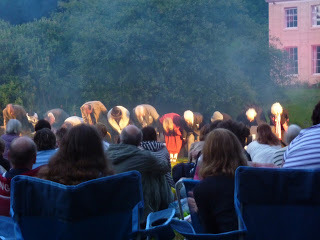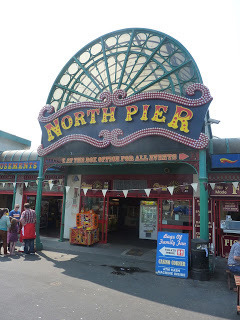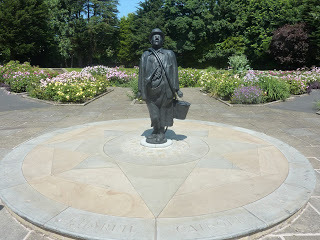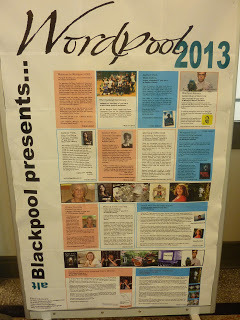Martin Edwards's Blog, page 220
July 10, 2013
Chapter One
Ah, those two little words that mean so much. Two words that are so exciting for any novelist, yet also often rather daunting. Chapter One. The start of a new book. A fresh beginning. A chance for a breakthrough, possibly. Or heartache and frustration, perhaps. Yep, I'm in philosophical mood this evening. For, having returned from work and had something to eat, I'm going to sit right down and write...well, a few paragraphs at least.
This new book is going to be another Lake District Mystery, and I've mapped out in my mind key elements of the main plot, which has its roots in the past, and also a couple of sub-plots.I've thought about the main characters, and have a good idea of their main personality traits. But there's still quite a lot I'm unsure about, especially about how the detective work will be carried out, that I hope and expect will be filled in during the months ahead.
As usual, I don't know how long exactly this book will take to write, though I'm hoping it won't be more than twelve months. We'll see. I am, though, excited by the main ideas behind the story, and that's mportant, because a writer needs to be excited by the basic concept of the book in order to keep going when morale starts to suffer - as it usually does at some point.
I'm rather tempted to write a number of blog posts about aspects of writing generally, and about the writing of the book specifically, as I proceed. How this will work out in practice is hard to foresee. I'll stop if I think it's getting tedious for my loyal readers, or if it gets in the way of the actual writing. But I hope it will be interesting for you, and for me. Over the past few weeks, I've been averaging a blog post a day, as well as venturing a few steps into the mysterious world of Twitter (a world I'm still rather unsure about, to be honest.) Now I'm planning to revert to three or four blog posts a week to give me a bit more space for writing the novel. As always, I'll very much welcome your comments, whether posted on the blog or sent by email.
One final word about Blogger. I hope I'm not speaking too soon, but it seems as though the wretched problem of spam comments has been resolved, at least for the present. I've not had any spam comments for a while now, whereas sometimes I was getting up to twenty a day - very tedious. I assume this also means that the Blogger stats are becoming more reliable. I'd welcome any feedback from fellow Blogger bloggers on their own experience..
This new book is going to be another Lake District Mystery, and I've mapped out in my mind key elements of the main plot, which has its roots in the past, and also a couple of sub-plots.I've thought about the main characters, and have a good idea of their main personality traits. But there's still quite a lot I'm unsure about, especially about how the detective work will be carried out, that I hope and expect will be filled in during the months ahead.
As usual, I don't know how long exactly this book will take to write, though I'm hoping it won't be more than twelve months. We'll see. I am, though, excited by the main ideas behind the story, and that's mportant, because a writer needs to be excited by the basic concept of the book in order to keep going when morale starts to suffer - as it usually does at some point.
I'm rather tempted to write a number of blog posts about aspects of writing generally, and about the writing of the book specifically, as I proceed. How this will work out in practice is hard to foresee. I'll stop if I think it's getting tedious for my loyal readers, or if it gets in the way of the actual writing. But I hope it will be interesting for you, and for me. Over the past few weeks, I've been averaging a blog post a day, as well as venturing a few steps into the mysterious world of Twitter (a world I'm still rather unsure about, to be honest.) Now I'm planning to revert to three or four blog posts a week to give me a bit more space for writing the novel. As always, I'll very much welcome your comments, whether posted on the blog or sent by email.
One final word about Blogger. I hope I'm not speaking too soon, but it seems as though the wretched problem of spam comments has been resolved, at least for the present. I've not had any spam comments for a while now, whereas sometimes I was getting up to twenty a day - very tedious. I assume this also means that the Blogger stats are becoming more reliable. I'd welcome any feedback from fellow Blogger bloggers on their own experience..
Published on July 10, 2013 12:22
July 8, 2013
Planning the next Lake District Mystery
I'm just about ready - at last! - to get going with Lake District Mystery number seven. And as part of my planning process, I've been weighing up what I can learn from past reviews, and especially reviews of The Frozen Shroud. One of the great merits of well thought-out reviews from an author's perspective is that they help to highlight what works and what does not. A single review in isolation may not make much difference, but I've now looked at about twenty reviews and I think I've picked up some helpful messages.
First, and I suppose most important in terms of morale and motivation, there's no sign that reviewers who have followed the series for several books are becoming weary of it. (A big relief, to be honest.) Some people have said that The Frozen Shroud is the strongest book in the series, and although that's a matter of subjective judgment, I'm pleased that there's enough freshness about the series after six books to keep most readers happy. Plot, setting and characterisation are the key elements, so I was very happy with this review from Steve Steinbock in the Jury Box of Ellery Queen's Mystery Magazine, one of the most important publications in the genre.
Was the whodunit plot strong enough? I did wonder about this, and one or two reviewers indicated that they were able to figure out what was going on sooner than usual. On the whole, however, the reaction expressed in Long and Short Reviews was more typical, and I found this encouraging, as the cast of suspects in this book was slightly smaller than in some of the others. This was a deliberate decision, but it did pose a challenge in terms of keeping the reader guessing. I went about it in a very specific way, though I can't say more than that here, for fear of spoilers!
One of the most satisfying reviews of all appeared in a blog I've never encountered before, Thiking About Books. It's not so much that this very detailed review heaps more praise on the story than various others. What really struck me was that the reviewer "got" very clearly what I was trying to do with this book. Of course, I'm glad the book found favour, but I'm even more gratified that some of the things going on below the surface of the story were identified. This is truly rewarding for any novelist, especially in a genre that tends to be assessed in a rather superficial way..
So much for the nice things, what about the criticisms? A couple of reviewers didn't love the characters, but they were very much in a minority. More significant is that the gradual way the suspense builds up appealed to some more than to others. Inevitably it's a question of personal taste. Some want instant gratification, some like the pleasure of suspense and uncertainty. But I am conscious that my Lakes books tend to build slowly, as do the books of a number of the authors whom I most admire. All this is, however, prompting me to contemplate a variation of approach in the new book. Not a crash-bang-wallop opening, so much as a different way of starting the story. How will that work? Well, that's the big question for the coming weeks!
First, and I suppose most important in terms of morale and motivation, there's no sign that reviewers who have followed the series for several books are becoming weary of it. (A big relief, to be honest.) Some people have said that The Frozen Shroud is the strongest book in the series, and although that's a matter of subjective judgment, I'm pleased that there's enough freshness about the series after six books to keep most readers happy. Plot, setting and characterisation are the key elements, so I was very happy with this review from Steve Steinbock in the Jury Box of Ellery Queen's Mystery Magazine, one of the most important publications in the genre.
Was the whodunit plot strong enough? I did wonder about this, and one or two reviewers indicated that they were able to figure out what was going on sooner than usual. On the whole, however, the reaction expressed in Long and Short Reviews was more typical, and I found this encouraging, as the cast of suspects in this book was slightly smaller than in some of the others. This was a deliberate decision, but it did pose a challenge in terms of keeping the reader guessing. I went about it in a very specific way, though I can't say more than that here, for fear of spoilers!
One of the most satisfying reviews of all appeared in a blog I've never encountered before, Thiking About Books. It's not so much that this very detailed review heaps more praise on the story than various others. What really struck me was that the reviewer "got" very clearly what I was trying to do with this book. Of course, I'm glad the book found favour, but I'm even more gratified that some of the things going on below the surface of the story were identified. This is truly rewarding for any novelist, especially in a genre that tends to be assessed in a rather superficial way..
So much for the nice things, what about the criticisms? A couple of reviewers didn't love the characters, but they were very much in a minority. More significant is that the gradual way the suspense builds up appealed to some more than to others. Inevitably it's a question of personal taste. Some want instant gratification, some like the pleasure of suspense and uncertainty. But I am conscious that my Lakes books tend to build slowly, as do the books of a number of the authors whom I most admire. All this is, however, prompting me to contemplate a variation of approach in the new book. Not a crash-bang-wallop opening, so much as a different way of starting the story. How will that work? Well, that's the big question for the coming weeks!
Published on July 08, 2013 11:29
A Mysterious Affair at Styal



Styal is a village in Cheshire where you can find one of the National Trust's great gems, Quarry Bank Mill, a wonderfully preserved and historically very important slice of Britain's industrial heritage in truly beautiful surroundings. Quarry Bank has been developed steadily in recent years,and not so long ago the garden of the old house was opened to the public. And on Saturday night, for the first time, I saw a play staged in those gardens in the open air - Agatha Christie's The Hollow.
It's a very long time since I watched a play in the open. The last one, a Noel Coward play, was well over twenty years ago. Of course, the weather is always a bit of a worry. But the weather on Saturday evening was superb, a real stroke of luck. And this, coupled with a pre-play picnic, made for a lovely way to end a great day that had begun with a trip around Blackpool's Stanley Park.
Strangely, this was the third Agatha Christie play I've seen in about three months, after not having seen one for many years. They have all been fun, even though I'm the first to admit that she was not as gifted at writing for the stage as she was at writing novels. But a large audience had a great time, not just because of the sunshine, but because Christie knew how to keep people engaged. The performances by members of the Wilmslow Green Room were very good, and I was pleased to recognise at least one of the actors who recently appeared in my own Victorian murder mystery.
The Hollow has never been one of my favourite Christie novels, I must confess. The plot, and the final twist, have never struck me as matching her best. But some of the characters are quite interesting, as is her decision to dispense with Poirot in the stage version of the story. I think that was a shrewd move, and the result was a piece of light entertainment that made for an idyllic midsummer's evening.


Published on July 08, 2013 03:27
July 5, 2013
Crime at the Seaside



 Yesterday saw me in conversation with Kate Ellis at Blackpool Central Library for a lunch event that formed part of Blackpool's Wordpool Festival. It was a bit different from previous gigs Kate and I have done together, and the freshness of the format appealed to me. I was pleased by the turn-out - forty-odd people on a very sunny day - and this and the diversity of the audience, who were very responsive and engaging, showed how well Lynne Pattinson and her colleagues in the Wordpool team have done in developing this festival over the past few years.
Yesterday saw me in conversation with Kate Ellis at Blackpool Central Library for a lunch event that formed part of Blackpool's Wordpool Festival. It was a bit different from previous gigs Kate and I have done together, and the freshness of the format appealed to me. I was pleased by the turn-out - forty-odd people on a very sunny day - and this and the diversity of the audience, who were very responsive and engaging, showed how well Lynne Pattinson and her colleagues in the Wordpool team have done in developing this festival over the past few years.It's the second time I've been part of Wordpool, and I sense that the festival is going from strength to strength. Such events need a number of years to establish themselves in the public consciousness, and I can only hope that, (even though the writers who take part aren't paid fees, so I'm not arguing for more money for me!) funding continues to make sure that Wordpool continues to flourish and grow. It was nice that the council's chief executive took the trouble to come along to the event, and I like to think he will have gone away happy with what his people in the libraries and culture part of the authority are doing to promote literature, and a good deal else besides, for the benefit of the local community..
This sort of thing matters everywhere, and arguably it's of especial value in a large town like Blackpool, which is embarking on a process of recovery and regeneration after years in the doldrums. It's a town which scores quite poorly on some indicators; for instance, I was told that there are many people with mental health and other problems, and even in an age of austerity, it's important for the country as a whole that these communities are given every chance and encouragement to thrive.
I've always had a soft spot for Blackpool, and as I said during the event, I'd rather like to write a short story set there. I went to the famous Illuminations as a child, and have taken my own children back there from time to time. We even once had a week-end break there in January, and while this may seem odd,i it was really enjoyable. It's a place that caters for families better than most, and you don't have to spend a fortune, either. Yes, it's a town with its tawdry aspects, but it also has a lot of vitality and some great traditions. Relying on past glories isn't enough, but I seized the chance to stay around for a day and a half and enjoy the sunshine. Not just visiting the piers and the sea front, but also Stanley Park, which is one of the largest and (in my opinion) most appealing of municipal parks in Britain, with a lovely heronry and much else besides. There's no denying that Blackpool still suffers from its reputation as a haven for rowdy stag and hen parties and it's not a must-see destination for enough people outside the north west of England, let alone overseas. But perhaps it should be. It's a resort full of character, and I'm really pleased to see it's heading in the right direction.






Published on July 05, 2013 23:00
Forgotten Book - The Hanging Captain
My Forgotten Book for today is another from the very reliable Golden Age writer Henry Wade. The Hanging Captain is a good story, although by no means his best, and it reintroduces Inspector Lott, who featured in The Dying Alderman, rather than Lott's Scotland Yard rival, Inspector John Poole, who was Wade's best known detective.
There are two fascinating aspects to the book. First, Wade's take on the decline of the ruling classes in Britain. This comes over very clearly and quite evocatively. Wade was an aristocrat himself, but although his writing often had a touch of nostalgia, plus a strong respect for tradition, he had no time for people who squandered the advantages life gave them, at a time when things wee tough for millions.
Ferris Court, the home of Sir Herbert Sterron, is a fading country house with an overgrown garden. Sterron is short of money and is starting to resort to selling (metaphorically) the family silver. He is impotent (this information is conveyed to us delicately but unmistakably) and his much younger wife is attracting other men. So when he is found hanging from a curtain cord it comes as no great surprise. Needless to say, though, before long murder is suspected.
The other striking element of the book is the friendly but competitive relationship between Lott and the local police. Lott has been called in because the locals fear embarrassment, since the High Sheriff of the county is a suspect. Wade knew what he was talking about, as he was once High Sheriff of Buckinghamshire. His account of police work and the humanity of police officers is a recurrent strength of his books. This one focuses on a time of death mystery, and the puzzle element is competent but no more than that. Overall, though, this is a novel with qualities which make it still worth reading today.
There are two fascinating aspects to the book. First, Wade's take on the decline of the ruling classes in Britain. This comes over very clearly and quite evocatively. Wade was an aristocrat himself, but although his writing often had a touch of nostalgia, plus a strong respect for tradition, he had no time for people who squandered the advantages life gave them, at a time when things wee tough for millions.
Ferris Court, the home of Sir Herbert Sterron, is a fading country house with an overgrown garden. Sterron is short of money and is starting to resort to selling (metaphorically) the family silver. He is impotent (this information is conveyed to us delicately but unmistakably) and his much younger wife is attracting other men. So when he is found hanging from a curtain cord it comes as no great surprise. Needless to say, though, before long murder is suspected.
The other striking element of the book is the friendly but competitive relationship between Lott and the local police. Lott has been called in because the locals fear embarrassment, since the High Sheriff of the county is a suspect. Wade knew what he was talking about, as he was once High Sheriff of Buckinghamshire. His account of police work and the humanity of police officers is a recurrent strength of his books. This one focuses on a time of death mystery, and the puzzle element is competent but no more than that. Overall, though, this is a novel with qualities which make it still worth reading today.
Published on July 05, 2013 15:53
Forgotten Book - Death at Broadcasting House
My Forgotten Book for today, Death at Broadcasting House (known as London Calling in the US) was a joint effort. The authors were two men who worked for the BBC, Val Gielgud, brother of John, and Eric Maschwitz, who used the pen-name Holt Marvell. Of the two, Gielgud was the great enthusiast for the genre. He was a good friend of Dorothy L. Sayers and John Dickson Carr, and ultimately earned election to the Detection Club. This early effort, however, is perhaps his most famous.
And that is because of the use of Broadcasting House as a backdrop for a pretty ingenious murder, when an actor is killed in front of an open microphone when . The setting is described in great detail, making the novel a wonderful period piece as far as a modern reader is concerned. No fewer than three floor plans are provided, and they are quite useful for anyone who wants to take a practical approach to sleuthing, and beat the likeable Inspector Spears to the solution.
I didn't find the murder mystery deeply engrossing, but the portrayal of life in and around the BBC at that time was absolutely fascinating. The plot, with all its contrivances, I'd rate as functional, but there is a great appeal in getting the "feel" of somewhere interesting, and the BBC under the legendary Lord Reith was certainly that.
Gielgud in particular was a capable writer, and it's a shame that his crime novels are now overlooked. He wrote five with Marvell/Maschwitz, concluding in 1940 with The First Television Murder, which I haven't read, but where presumably the clue is in the title. Later, he wrote solo, and his career lasted until the mid 70s. In addition to his long and successful career at the BBC, he also found time to get married five times. A busy man.
And that is because of the use of Broadcasting House as a backdrop for a pretty ingenious murder, when an actor is killed in front of an open microphone when . The setting is described in great detail, making the novel a wonderful period piece as far as a modern reader is concerned. No fewer than three floor plans are provided, and they are quite useful for anyone who wants to take a practical approach to sleuthing, and beat the likeable Inspector Spears to the solution.
I didn't find the murder mystery deeply engrossing, but the portrayal of life in and around the BBC at that time was absolutely fascinating. The plot, with all its contrivances, I'd rate as functional, but there is a great appeal in getting the "feel" of somewhere interesting, and the BBC under the legendary Lord Reith was certainly that.
Gielgud in particular was a capable writer, and it's a shame that his crime novels are now overlooked. He wrote five with Marvell/Maschwitz, concluding in 1940 with The First Television Murder, which I haven't read, but where presumably the clue is in the title. Later, he wrote solo, and his career lasted until the mid 70s. In addition to his long and successful career at the BBC, he also found time to get married five times. A busy man.
Published on July 05, 2013 00:30
Forgotten Book - Murder at Broadcasting House
My Forgotten Book for today, Murder at Broadcasting House (known as London Calling in the US) was a joint effort. The authors were two men who worked for the BBC, Val Gielgud, brother of John, and Eric Maschwitz, who used the pen-name Holt Marvell. Of the two, Gielgud was the great enthusiast for the genre. He was a good friend of Dorothy L. Sayers and John Dickson Carr, and ultimately earned election to the Detection Club. This early effort, however, is perhaps his most famous.
And that is because of the use of Broadcasting House as a backdrop for a pretty ingenious murder, when an actor is killed in front of an open microphone when . The setting is described in great detail, making the novel a wonderful period piece as far as a modern reader is concerned. No fewer than three floor plans are provided, and they are quite useful for anyone who wants to take a practical approach to sleuthing, and beat the likeable Inspector Spears to the solution.
I didn't find the murder mystery deeply engrossing, but the portrayal of life in and around the BBC at that time was absolutely fascinating. The plot, with all its contrivances, I'd rate as functional, but there is a great appeal in getting the "feel" of somewhere interesting, and the BBC under the legendary Lord Reith was certainly that.
Gielgud in particular was a capable writer, and it's a shame that his crime novels are now overlooked. He wrote five with Marvell/Maschwitz, concluding in 1940 with The First Television Murder, which I haven't read, but where presumably the clue is in the title. Later, he wrote solo, and his career lasted until the mid 70s. In addition to his long and successful career at the BBC, he also found time to get married five times. A busy man.
And that is because of the use of Broadcasting House as a backdrop for a pretty ingenious murder, when an actor is killed in front of an open microphone when . The setting is described in great detail, making the novel a wonderful period piece as far as a modern reader is concerned. No fewer than three floor plans are provided, and they are quite useful for anyone who wants to take a practical approach to sleuthing, and beat the likeable Inspector Spears to the solution.
I didn't find the murder mystery deeply engrossing, but the portrayal of life in and around the BBC at that time was absolutely fascinating. The plot, with all its contrivances, I'd rate as functional, but there is a great appeal in getting the "feel" of somewhere interesting, and the BBC under the legendary Lord Reith was certainly that.
Gielgud in particular was a capable writer, and it's a shame that his crime novels are now overlooked. He wrote five with Marvell/Maschwitz, concluding in 1940 with The First Television Murder, which I haven't read, but where presumably the clue is in the title. Later, he wrote solo, and his career lasted until the mid 70s. In addition to his long and successful career at the BBC, he also found time to get married five times. A busy man.
Published on July 05, 2013 00:30
July 4, 2013
Brake: movie review
Brake is an unusual film from last year, directed by Gabe Torres and starring Stephen Dorff, neither of whom I'm familiar with. It's a modern film, in style and plot-line, but it raises a question about writing that is familiar whether we consider prose, television or film. In fact, a question that lingered in my mind in relation to a recent episode of Agatha Christie's Marple,
The issue is this. When an idea for a story occurs to a writer, an early question is whether it will make a full-length novel or a short story, a short television programme or something longer, a series perhaps. Or a short movie as opposed to a full-length feature film. The dilemma for the writer is that one doesn't want to "waste" a great idea on a small scale form. But on the other hand, stretching out an idea beyond its natural limits can ruin everything. Greenshaw's Folly was a two-hour show based on a short story. The screenplay writer added in elements from a second Agatha Christie story to make the episode work, and (just about) got away with it.
Brake involves an American secret service agent called Jeremy (Dorff), who wakes up to find himself encased in a transparent box. It turns out that he is locked in the boot of a car, although conveniently his captors have provided him with a telephone. Their plan is to torture him to make him reveal the whereabouts of the President's secret bunker.Almost all the movie takes place in this confined setting, quite a test of acting skill as well of the writer's imagination. Then we are supplied with a double twist ending.
I enjoyed the film, but felt that it was a good example of an idea stretched beyond its natural length. I suppose a movie of sixty minutes wouldn't have been commercial enough, but I'm afraid the limited nature of the scenario became a bit wearing, even though Dorff did a good job with his role. And as a result,there was too much time for the audience to feel as trapped as poor old Jeremy. And too much time to ponder the gaps in the plot as well. A pity.
The issue is this. When an idea for a story occurs to a writer, an early question is whether it will make a full-length novel or a short story, a short television programme or something longer, a series perhaps. Or a short movie as opposed to a full-length feature film. The dilemma for the writer is that one doesn't want to "waste" a great idea on a small scale form. But on the other hand, stretching out an idea beyond its natural limits can ruin everything. Greenshaw's Folly was a two-hour show based on a short story. The screenplay writer added in elements from a second Agatha Christie story to make the episode work, and (just about) got away with it.
Brake involves an American secret service agent called Jeremy (Dorff), who wakes up to find himself encased in a transparent box. It turns out that he is locked in the boot of a car, although conveniently his captors have provided him with a telephone. Their plan is to torture him to make him reveal the whereabouts of the President's secret bunker.Almost all the movie takes place in this confined setting, quite a test of acting skill as well of the writer's imagination. Then we are supplied with a double twist ending.
I enjoyed the film, but felt that it was a good example of an idea stretched beyond its natural length. I suppose a movie of sixty minutes wouldn't have been commercial enough, but I'm afraid the limited nature of the scenario became a bit wearing, even though Dorff did a good job with his role. And as a result,there was too much time for the audience to feel as trapped as poor old Jeremy. And too much time to ponder the gaps in the plot as well. A pity.
Published on July 04, 2013 04:17
July 3, 2013
Writing a memoir
I've never had any urge to write a memoir or autobiography, but I've read a good many. Most of them leave something to be desired, often because the author succumbs to the temptation to write in a self-serving way. But there are some good ones around, including Time to be in Earnest, by P.D. James, which is (of course) very readable indeed. And I quite liked Agatha Christie's autobiography. Even there, though, one wonders about what has been left out, for instance because the author found it too difficult to write about.
Memoirs of showbiz stars and politicians are especially dodgy. I am a huge fan of Dionne Warwick, whose voice at its best was almost unequalled in its power, range and sensitivity. Yet her memoirs were very disappointing as far as I was concerned. I learned little of interest and felt that she was too anxious to present herself positively.
Accordingly, I approached the brand new autobiography of Burt Bacharach, Anyone Who Had a Heart: my life and music (published by Atlantic Books in the UK) with trepidation. I admire the composer enormously, but I've heard all his anecdotes before. Or so I thought. I wasn't prepared for a book that was far from an exercise in self-justification. Bizarrely, it's more like an exercise in self-flagellation. There's a great deal about his failed marriages and other relationships (he was the perfect choice to write a movie song called Wives and Lovers, that's for sure) and a huge amount about the tragic life and eventual suicide of his daughter Nikki, If I had three ex-wives, I am fairly sure I wouldn't have the courage to invite them to express their views about me in my autobiography, but that's what we have in this book, and it sometimes makes for very bleak reading.
The ghost writer is Robert Greenfield, a long-time journalist for Rolling Stone, and in many ways he has done a very good job. It's an extremely readable book, with many witty and unexpected stories (I specially liked the one about Elizabeth Taylor's dining habits). More importantly, it casts light on what it is like to be an obsessive, someone so ferociously devoted to perfectionism in his craft that he allows other things to happen in his life that are a long way short of perfect. It's an extraordinarily human, warts and all portrait. For a novelist like me, this makes riveting reading, and it would do even if I had not loved the man's music for as long as I can remember.
I do, however, think that Greenfield could have produced an even better book with a bit more work. There's not enough analysis of the people, the fascinating world that Bacharach has moved in, or of the music. It's very interesting and entertaining, there's plenty of scope to read between the lines, and it must be one of the best showbiz memoirs for many a long year. But I still wish Greenfield had shown some of the perfectionsm of his subject. Had he done so, he'd have contributed to an even better book.
Memoirs of showbiz stars and politicians are especially dodgy. I am a huge fan of Dionne Warwick, whose voice at its best was almost unequalled in its power, range and sensitivity. Yet her memoirs were very disappointing as far as I was concerned. I learned little of interest and felt that she was too anxious to present herself positively.
Accordingly, I approached the brand new autobiography of Burt Bacharach, Anyone Who Had a Heart: my life and music (published by Atlantic Books in the UK) with trepidation. I admire the composer enormously, but I've heard all his anecdotes before. Or so I thought. I wasn't prepared for a book that was far from an exercise in self-justification. Bizarrely, it's more like an exercise in self-flagellation. There's a great deal about his failed marriages and other relationships (he was the perfect choice to write a movie song called Wives and Lovers, that's for sure) and a huge amount about the tragic life and eventual suicide of his daughter Nikki, If I had three ex-wives, I am fairly sure I wouldn't have the courage to invite them to express their views about me in my autobiography, but that's what we have in this book, and it sometimes makes for very bleak reading.
The ghost writer is Robert Greenfield, a long-time journalist for Rolling Stone, and in many ways he has done a very good job. It's an extremely readable book, with many witty and unexpected stories (I specially liked the one about Elizabeth Taylor's dining habits). More importantly, it casts light on what it is like to be an obsessive, someone so ferociously devoted to perfectionism in his craft that he allows other things to happen in his life that are a long way short of perfect. It's an extraordinarily human, warts and all portrait. For a novelist like me, this makes riveting reading, and it would do even if I had not loved the man's music for as long as I can remember.
I do, however, think that Greenfield could have produced an even better book with a bit more work. There's not enough analysis of the people, the fascinating world that Bacharach has moved in, or of the music. It's very interesting and entertaining, there's plenty of scope to read between the lines, and it must be one of the best showbiz memoirs for many a long year. But I still wish Greenfield had shown some of the perfectionsm of his subject. Had he done so, he'd have contributed to an even better book.
Published on July 03, 2013 04:18
July 2, 2013
Alarum and Excursion by Virginia Perdue - review
Every now and then, a publisher brings out a series of classic crime novels of the past. I can think of a few series of this kind that, much to my regret, did not last very long. But one of the longest and best series was the "Fifty Classics of Crime Fiction 1900-1950", edited by two Americans with a great knowledge of and love for the genre, Jacques Barzun and Wendell Hertig Taylor.
I have read only about twenty of the fifty books they chose. Naturally, I've loved some of the books, and wondered about one or two why Barzun and Taylor rated them so highly. These things are to some extent a matter of personal taste. But their choices, if sometimes idiosyncratic, were always interesting. An example is Alarum and Excursion, by Virginia Perdue, her last book, first published in 1944.
I was prompted to read this one by an enthusiastic review by John Norris of Pretty Sinister Books. John, like Puzzle Doctor and Curt Evans among other enthusiasts for the classic mystery, is a blogger whose judgments about a book always command respect. This is a case of a book which I didn't love as much as John did, but I can see why he, along with Barzun and Taylor, admired it.
It's an amnesia story. The hero is a wealthy businessman in his sixties who has come across a formula for a fuel that could affect the course of the war, and much else besides. When he comes round, he slowly pieces together what has been going on in his life. As ever, the question is: who can he trust? Now, I am not a great fan of stories about secret formulae, and amnesia cases are also a bit of a cliche of the genre. But Perdue does a good job of creating an unusual story-line and I agree with John and others that the finale is excellent.
This book is good but not, in my view, an absolute classic - it reads a bit like a novel by Helen McCloy, but does not have quite the same power. All the same, it's an entertaining read, and I'm glad I gave it a go. As for Perdue herself, I know little. Even Barzun and Taylor don't rate her other books. Perhaps she died just as she was getting into her stride as a novelist, which is a sad thought.
I have read only about twenty of the fifty books they chose. Naturally, I've loved some of the books, and wondered about one or two why Barzun and Taylor rated them so highly. These things are to some extent a matter of personal taste. But their choices, if sometimes idiosyncratic, were always interesting. An example is Alarum and Excursion, by Virginia Perdue, her last book, first published in 1944.
I was prompted to read this one by an enthusiastic review by John Norris of Pretty Sinister Books. John, like Puzzle Doctor and Curt Evans among other enthusiasts for the classic mystery, is a blogger whose judgments about a book always command respect. This is a case of a book which I didn't love as much as John did, but I can see why he, along with Barzun and Taylor, admired it.
It's an amnesia story. The hero is a wealthy businessman in his sixties who has come across a formula for a fuel that could affect the course of the war, and much else besides. When he comes round, he slowly pieces together what has been going on in his life. As ever, the question is: who can he trust? Now, I am not a great fan of stories about secret formulae, and amnesia cases are also a bit of a cliche of the genre. But Perdue does a good job of creating an unusual story-line and I agree with John and others that the finale is excellent.
This book is good but not, in my view, an absolute classic - it reads a bit like a novel by Helen McCloy, but does not have quite the same power. All the same, it's an entertaining read, and I'm glad I gave it a go. As for Perdue herself, I know little. Even Barzun and Taylor don't rate her other books. Perhaps she died just as she was getting into her stride as a novelist, which is a sad thought.
Published on July 02, 2013 04:28



